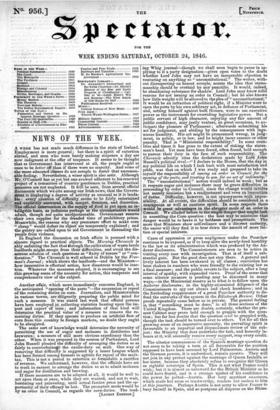Cases of oppression or gross negligence under the Poor-law continue
to be exposed, as if to keep alive the newly-bred hostility to the law or its administration which was produced by the An- dover disclosures. The Commissioners are seen to be active in visiting every case with investigation. That is of itself a sub- stantial gain. But the good does not stop there. A general and lively interest has been awakened in all classes ; conviction has been shaken in numbers who were friendly to the existing law as a final measure; and the public reverts to the subject, after a long interval of apathy, with expanded views. Proof of the sense that some ulterior, measure is pending may be discerned in many ways,—in the Ministerial reserve as to what is to follow upon the Andover disclosures ; in the highly-stimulated diligence' of the Commissioners to spy out abuses arid check harshness ; and in the foreboding reappearance of a great Poor-law authority to de- fend the outworks of the system in the Edinburgh Review. Other proofs repeatedly come before us in private. The general feeling is, that "something must be done," in all three sections of the United Kingdom. There are doubts, certainly, whether the pre- sent Cabinet may prove bold enough to grapple with the ques- tion; but far less doubts that the question must be grappled with, though the task should be turned over to others. Yet for all this growing- sense of an imperative necessity, the prevailing spirit is favourable to an impartial and dispassionate review of the sub- ject: the Ministry that does undertake the task, and honestly la- bours at it, will assuredly receive every support, reap every credit.


























